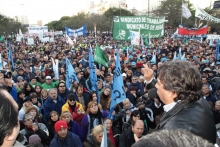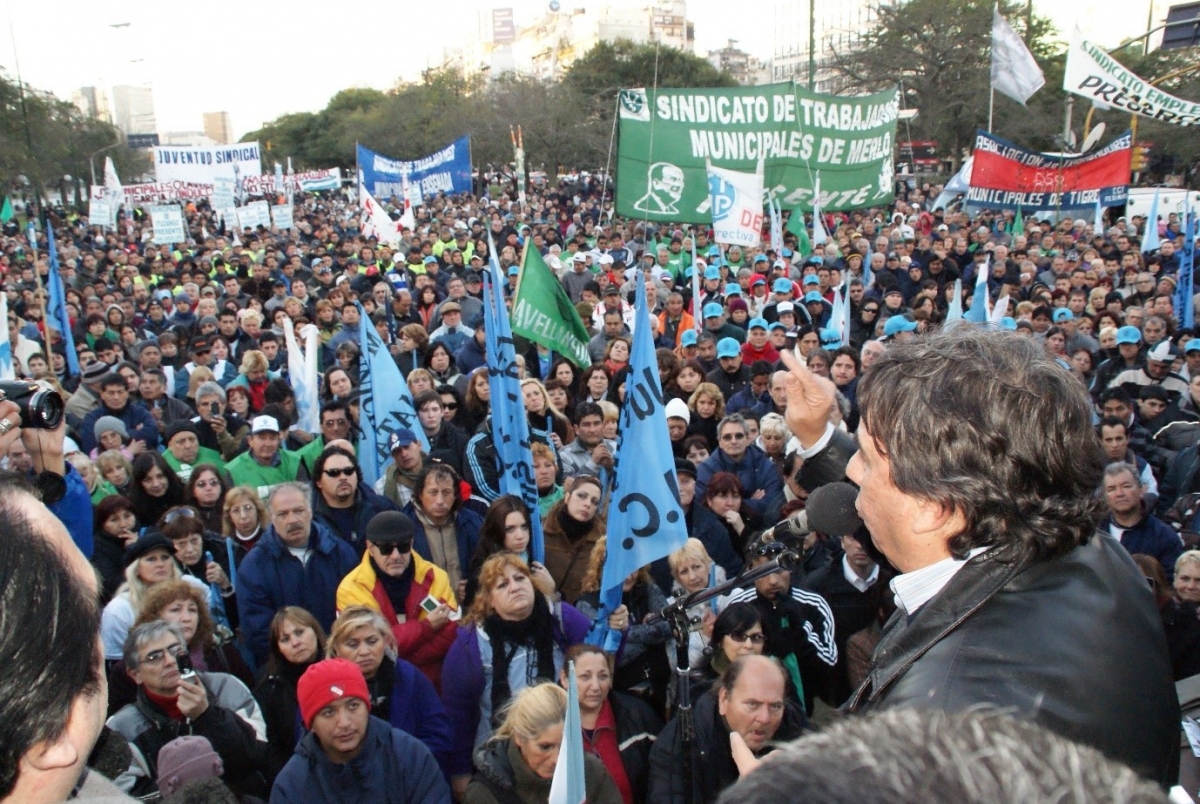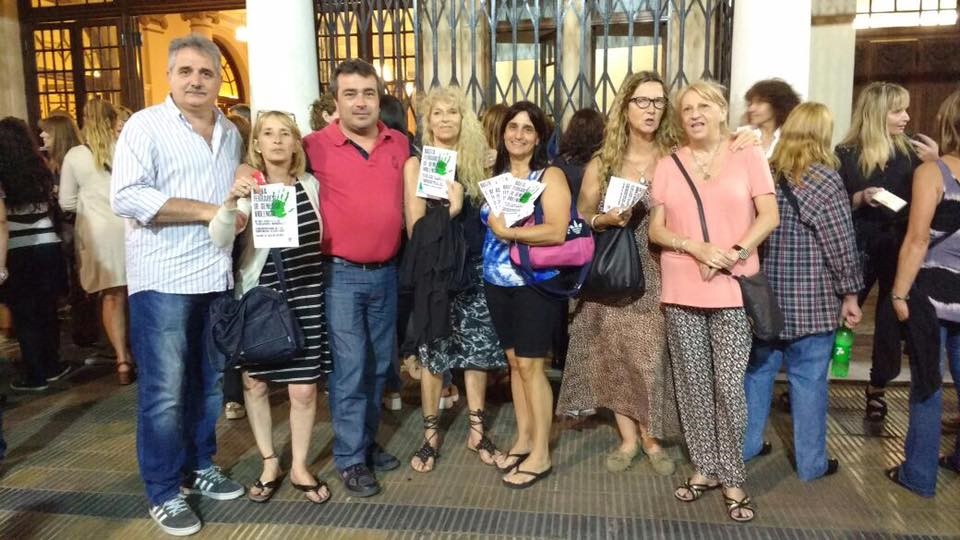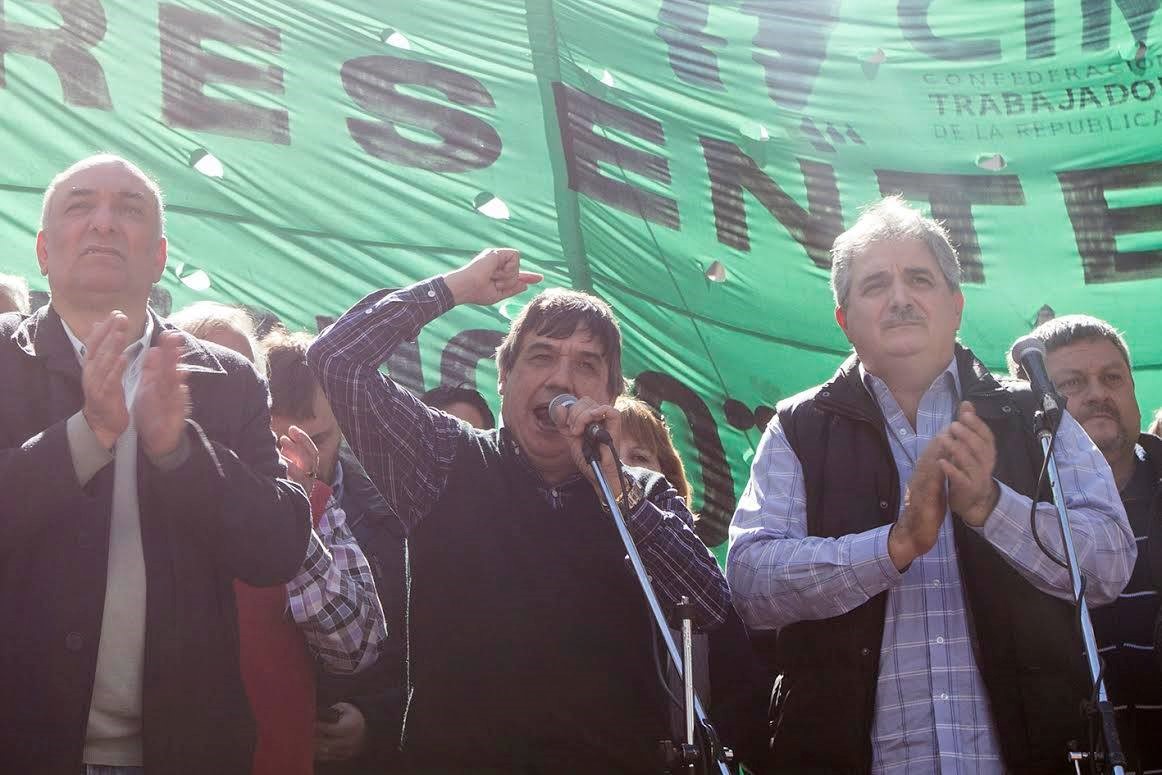Municipal workers in the Province of Buenos Aires and their trade unions take action to seek compliance with the Paritaria Act on collective bargaining in local and regional government

Members of the Confederación de Trabajadores Municipales de la República de Argentina (CTM), affiliated to the PSI, took action in 2016 and again in 2017, calling on mayors to comply with Provincial Act 14.656 of 2015 on Labour Relations and Collective Bargaining for local government workers in Buenos Aires province, generally known as the Paritaria Act.
This law replaced Act 11.757, which allowed local governments in Buenos Airesprovince to unilaterally determine working conditions and pay of local government workers and was ruled to be unconstitutional by the province’s Supreme Court.
|
|
|---|
Rubén García, FESIMUBO and CTM General Secretary, makes a speech to local government workers at a rally to oppose decree 784/2016, which aims to limit the scope of Act 14656 on collective bargaining in Buenos Aires province. August 2016. |
The Paritaria Act is an important achievement by local and regional trade unions and the public sector in Argentina. It recognises the collective bargaining rights of local government workers in Buenos Aires, the country’s biggest and most populous province. It requires local authorities to negotiate with trade unions on working conditions and pay for local government workers. It includes provisions on working time, the living wage and paid leave for victims of domestic violence. It set up a provincial fund to guarantee payment of wages in the event of municipal bankruptcy and set a ceiling for outsourcing (20 per cent of the total workforce within five years).
However, collective bargaining does not exist in most of the country’s 2,189 municipalities and is partly and formally established in only 44 of the 135 municipalities in Buenos Aires province, where the Paritaria Act is in force. The CTM’s General Secretary, Rubén "Cholo" García, who is also General Secretary of the Federation of Buenos Aires Local Government Trade Unions (FESIMUBO), criticised the negative attitude of mayors towards implementation of the Paritaria Act and said:
“So far, just over 40 municipalities have signed collective agreements and it is clear that it does not depend on the political affiliation of their governments. The problem is that the mayors, whatever their political allegiance, do not want to negotiate with municipal workers on equal terms”.
After the general strike of April 2017, called by the Confederación General del Trabajo (CGT) and supported by the CTM, the provincial federations affiliated to the CTM, and their own affiliates, are continuing to take action in various ways, including strikes, demonstrations, road-blocks and the occupation of municipal buildings.
FESIMUBO, the CTM’s biggest provincial federation, has focused on taking action and putting pressure on those municipalities that are most actively resisting collective bargaining. It has organised regional plenaries of union general secretaries, where it is decided to target a particular municipality. A large number of trade union activists is then sent in to support local workers, with material and moral support from all the other municipal unions in the province, with the aim of changing the balance of social and political forces in favour of the workers in that particular municipality.
The authorities have sometimes repressed action by municipal workers taking action in support of the Paritaria Act and the CTM has denounced these cases. For example, on 25 November 2016, the mayor of Avellaneda (Buenos Aires), Jorge Ferraresi, ordered the police to repress a demonstration organised by members of the Avellaneda Local Government Workers’ Union (STMA), the local CTM affiliate. Eight workers were injured by rubber bullets fired by the police.
|
|
|---|
CTM representatives and activists from the Avellaneda Local Government Workers’ Union (STMA) demonstrating in front of the Avellaneda (Buenos Aires) Town Hall against the repression. |
Many municipalities have still not agreed pay rises.
“The mayors say they have no money and that they will have to ask the provincial government. The provincial government says it will have to ask the national government. Local government workers are always at the end of the queue and are on the lowest wages”, said García. Some mayors proposed an end of year bonus but the CTM felt this was a “palliative”. “We didn’t ask for a bonus, we asked for a pay rise and negotiations as set out in the Paritaria”, said García.
|
|
|---|
Rubén García, FESIMUBO and CTM General Secretary ; Daniel Ferro Chair of the CTM’s national executive and Gustavo Seva, FESIMUBO Statistics, Training and Education Officer at the rally in August 2016. |
During 2017, Mauricio Macri’s national government pushed on with its reform policies and aims to fix a single annual pay agreement date for both local and regional governments. He plans to adjust pay in line with official annual inflation forecasts, without taking into account the decline in real wages for local, regional and national government employees during 2016. In this context, pay talks in the local government sector in 2017 have generally resulted in another reduction in real wages, although the situation of local municipalities varies widely. Some workers have managed to recoup part of the real value of their wages or at least limit the fall in their real wages, but this is not the general picture.
The CTM believes that the Macri government is determined to begin the second stage of its reform programme whatever the results of the next legislative elections. The first stage introduced a price increase several times higher than inflation and initiated the start of a new cycle of external debt. This handed public service providers a massive increase in profits. The second stage will focus on fiscal reform and transfers to the provinces and municipalities, which are currently responsible for managing health, education, urban security and other services. The expected changes will violate the principle of quality public service provision and undermine decent working conditions for local government workers.
CTM workers will continue to take action in defence of their demands for full compliance with the Paritaria Act and observance of basic collective bargaining rights for local and regional government workers. The issue will be discussed at a public meeting organised by the PSI at the next International Labour Conference at the International Labour Organisation (ILO) on Tuesday 6 June 2017 13:00-14:00.
Article prepared with the help of the CTM.




